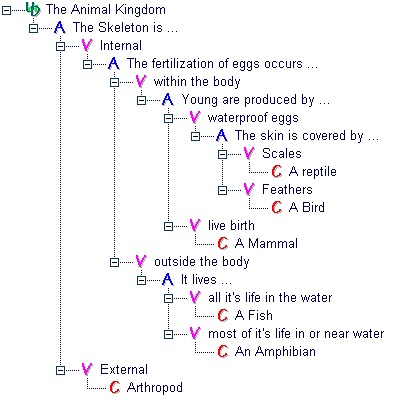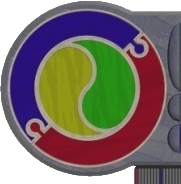 |
|
 |
| |
Artificial Intelligence
eXercise #1
Expert Systems
Some of the following exercise material was taken from the ESHELL User
Manual from Terry Dwyer. Exercises are adapted to suit ESBuilder Web
from McGoo Software.
- Given the following tree:

use ES-Builder Web to construct a corresponding Expert System. Interrogate
your expert system to ensure it makes the correct conclusions.
- PRIMATE-ES: We can classify various
representative members of families in the Sub-order Anthropod by using
external characteristice as follows:
- MAN : no tail, big toe not opposable, thumb opposable
- APES: no tail, big toe and thumb opposable
- OLD WORLD MONKEYS: have a tail, big toe and thumb opposable
- MARMOSETS: a long tail, big toe opposable, thumb not opposable
- NEW WORLD MONKEYS: Long tail, big toe and thumb opposable
Using ES-Tree Builder, construct a valid tree containing the attributes,
values and conclusions contained in the information above. Print
this out for verification by your teacher. Save your tree on your
H: drive and call it PRIMATES.
Using ES-Builder, implement your decision tree and interrogate it
to ensure it is functioning correctly. Save your expert system on
your H: drive using the name PRIMATES
- Given the following:
Diamond has a specific gravity between 3 and 3.8, is of hardness 10
and has a cubic crystal system.
Topaz has a specific gravity between 3 and 3.8, a hardness of 8 and
has an orthorhombic crystal system
Quartz has a trigonal crystal system, hardness 9 and a specific gravity
below 3
Sapphire has a trigonal crystal system, hardness 9 and a specific
gravity over 3.9
Construct a valid Tree that captures the above information. you may
choose to construct 'ranges' of values to cope with attributes that
do not have discrete values. Print out your tree for teacher verification.
Save your tree on your H: drive.
Create a corresponding expert system, using ES-Builder to correctly
implement the tree, test it and save it to your H: drive.
- Asthma is generally identified by the symptoms of wheezing and difficulty
in breathing. Asthma has a number of causes with pollen and animal
hairs being the main ones. A prevention is to avoid the allergens
and a bronchodilator and shots being the treatments.
Hay fever is generally identified by sore and itchy eyes together
with a runny, stuffy nose. Pollen is the major cause and prevention
is limited to having shots before the season that produces the pollen.
A treatment is antihistamine tablets.
Excema is generally identified by a rash on the hands, face and/or
neck together with scaly skin. Major causes are milk, flour, eggs,
nuts, shellfish and food acids. Antihistamine is a treatment and the
best prevention is to adjust the diet.
Develop a tree that summarises the above afflictions. Save and print
your tree for teacher verification. Use your tree to generate and
save an Expert System, and interrogate it to ensure it is working
correctly.
Note: for this exercise, you will neet to decide what are attributes,
what are values and what are conclusions that this system could make
- there are a few different systems possible, depending on how you
approach the problem.
- If an expert system contains an error which results in damage of
one kind or another, who is responsible? What if damage of some kind
is caused by erroneous advice from a human expert which could have
been prevented by the use of an available expert system?
|
|
|
 |
|
 |
|


